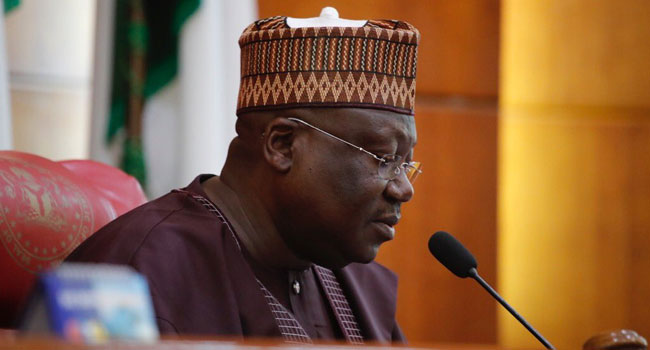Politics
Why Nigeria relies on foreign loans for infrastructural development – Lawan

The Senate President, Ahmad Lawan, on Tuesday explained why the Federal Government relied on external loans to address the country’s infrastructural deficit.
Lawan, who addressed senators in his welcome address on the first plenary session of the year at the National Assembly Complex, Abuja, expressed concerns that the funding of the 2022 Budget was predicated on significant borrowing.
He said: “Our country is caught between the devil and the deep blue sea. We have to construct and provide infrastructure, in all parts of our country because infrastructure is needed for our nation to develop.
“However, we do not generate enough revenues to fund the provision of such infrastructure. Until more revenues are generated, the country has to borrow and also resort to other sources of funding our infrastructural development. But we cannot continue to borrow endlessly.
“It is imperative that we need to improve on the revenue to Gross Domestic Product (GDP) ratio. At about 8 percent Revenue to Gross Domestic Product (GDP) ratio, our country is basically at 50 percent of what is required of the revenue to GDP of 15% for it to support any significant economic development.”
The Senate President assured that the upper legislative chamber would collaborate with revenue-generating agencies in order to reduce borrowings for critical projects in the country.
READ ALSO: Omokri tags Buhari ‘enemy of progress’, after fresh appeal for foreign loans
Lawan added: “The Senate will develop a strategy of engagement with revenue-generating agencies on how to make them achieve their targets and generate more revenues in 2022. The Senate will ensure that we boost their revenue-generating drive with a view to reducing borrowing for the development of our much-needed infrastructure. This is a major challenge for our development and we need to treat as such.”
He also spoke on Electoral Act Amendment Bill and promised to ensure robust discussion by stakeholders in order to ensure presidential assent to the bill ahead of the 2023 elections.
“The Senate postponed discussions on the consideration of the response of Mr President on the Electoral Act 2010 Amendment Bill to enable us to consult with our counterparts in the House of Representatives and also consult with our Constituents. Like we all know, the Senate and indeed the National Assembly worked so hard on the Bill. Having consulted, the Senate will expeditiously look into the issue,” the Senate President concluded.
Join the conversation
Support Ripples Nigeria, hold up solutions journalism
Balanced, fearless journalism driven by data comes at huge financial costs.
As a media platform, we hold leadership accountable and will not trade the right to press freedom and free speech for a piece of cake.
If you like what we do, and are ready to uphold solutions journalism, kindly donate to the Ripples Nigeria cause.
Your support would help to ensure that citizens and institutions continue to have free access to credible and reliable information for societal development.
























